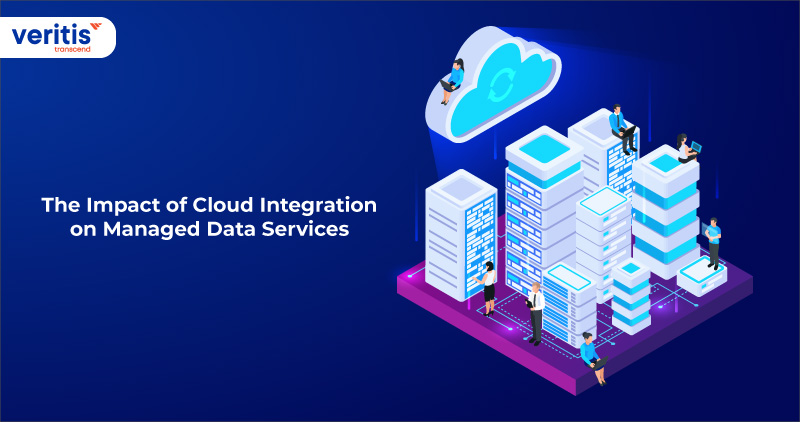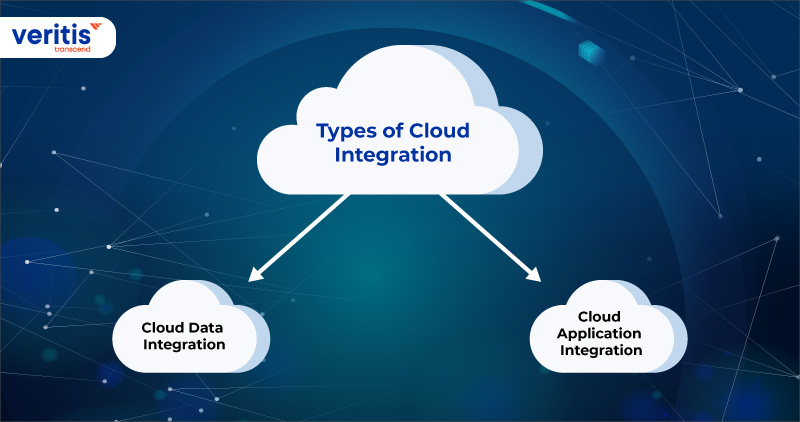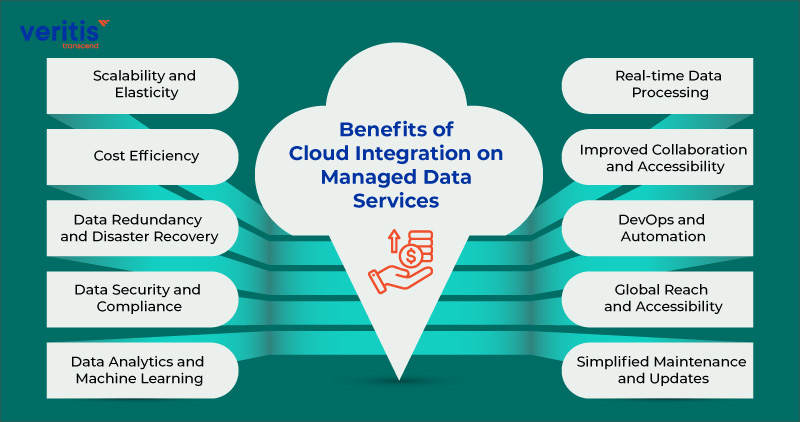
Enterprises constantly seek ways to optimize their data management strategies in today’s data-driven world. Managed Data Services (MDS) play a critical role in this pursuit by providing comprehensive data storage, processing, and analysis solutions. However, as cloud computing continues to evolve, integrating cloud technologies into MDS has emerged as a game-changer. We will delve into the deep impact of cloud integration on Managed Data Services, exploring the technical aspects and benefits of this transformation.
Understanding the Importance and Mechanisms of Cloud Integration
In the contemporary business field, the complexity of IT environments escalates with the growing number of daily applications enterprises use. Cloud Integration, the pivotal process of consolidating data from diverse sources into a unified platform, serves as the linchpin for breaking down software silos. This seamless integration facilitates easy real-time access and management of business applications and data from disparate systems.
Deploying cloud integration platforms becomes imperative, especially before the exponential increase in application volumes further complicates IT domains. These platforms accelerate connectivity and enhance visibility, ultimately optimizing key business processes in a centralized environment.
The demand for cloud system integration arises from combining and managing distinct data sets and cloud resources while unifying various cloud environments with on-premises data. While in-house management of integration is plausible, it can prove time-consuming and costly.
Cloud integration platforms streamline the connective process, reducing lead time for deployment. By leveraging different types and methods of cloud integration, businesses can position themselves for more efficient management and optimization of processes, operations, and customer interactions.
Types of Cloud Integration

Cloud integration manifests in different forms: cloud-to-cloud integration, cloud-to-on-premises integration, or a hybrid blend of both. These integration solutions cater to diverse business facets, primarily focusing on data and applications. The following types of cloud integrations can be harnessed by IT teams tailored to specific data transfer volumes and speeds:
1) Cloud Data Integration
This category facilitates seamless data flow across diverse repositories, involving processing, transferring, and transforming information in batches or real-time during integration. Businesses often employ cloud data integration solutions to transmit raw, unstructured cloud data for specific use cases. Additionally, it allows the centralization of cloud data with mainframe system data management as a service or legacy servers. Examples include:
- Business Analytics
- Master cloud data management services
- Artificial intelligence training
- The ELT process for transforming raw data into data lakes or warehouses
Dedicated cloud data integration solutions perform data cleansing, quality checking, masking, and batch processing.
2) Cloud Application Integration
This type unifies various applications, ensuring continuous interoperability and functionality. It entails applications sharing requests, commands, and other mechanisms to trigger business activities, facilitating data exchange through real-time dataset integrations between involved systems. Examples encompass critical business apps like sales reporting, inventory management, customer relationship management, and financial applications.
Cloud application integration guides businesses in optimizing workflows, constructing insight-driven data models, predicting future demands through machine learning models, and modernizing their infrastructure.
Useful Link: Cloud Native Applications: Understanding the Essentials
Benefits of Cloud Integration on Managed Data Services

1) Scalability and Elasticity
One of the primary benefits of integrating cloud services into Managed Data Services is the ability to scale resources quickly and achieve elasticity. Traditional MDS systems often need more support in terms of capacity and performance, making it challenging to adapt to changing workloads. Organizations can leverage the extensive computing and storage resources with cloud integration.
Cloud providers like Amazon Web Services (AWS), Microsoft Azure, and Google Cloud Platform offer auto-scaling capabilities, allowing MDS to adjust resources based on demand dynamically. This elasticity ensures that organizations can handle sudden spikes in data processing requirements without significant upfront investments in infrastructure.
2) Cost Efficiency
Cost optimization is a crucial consideration for any organization. Cloud integration can lead to substantial cost savings for Managed Data Services. Instead of committing resources to invest in and uphold hardware within physical facilities, organizations can leverage the pay-as-you-go pricing model cloud providers offer.
This model permits companies to pay only for the resources they use, reducing capital expenditures and minimizing operational costs. Moreover, cloud providers often offer various pricing options, such as reserved and spot instances, to optimize costs based on workload characteristics.
3) Data Redundancy and Disaster Recovery
Data redundancy and disaster recovery are critical aspects of cloud data management services. With cloud integration, organizations can benefit from built-in redundancy and disaster recovery capabilities cloud providers provide. Data management as a service can be replicated across numerous data centers and regions, ensuring high availability and data durability.
In the event of a disaster or data center managed services outage, cloud providers offer robust disaster recovery options that allow organizations to quickly recover their data and applications. This level of resilience is often challenging and costly to achieve with traditional on-premises MDS solutions.
4) Data Security and Compliance
Data security and compliance are paramount issues for organizations, especially those dealing with sensitive or regulated data management as a service. Cloud providers invest laboriously in security measures and compliance certifications, making them well-equipped to address these concerns.
When integrating cloud services into Managed Data Services, organizations can leverage their chosen cloud provider’s security features and compliance certifications. This includes features like rest and transit encryption, identity and access management, and auditing capabilities. Cloud providers also offer compliance certifications for various industry standards, such as HIPAA and GDPR, easing organizations’ compliance burden.
5) Data Analytics and Machine Learning
Cloud integration opens new possibilities for cloud data analytics and machine learning within Managed Data Services. Cloud data analytics providers offer a wide range of analytics and AI/ML services that can be seamlessly integrated into MDS workflows. This permits companies to extract valuable insights from their data service management and make data-driven decisions more effectively.
Services like Amazon Redshift, Azure Synapse Analytics, and Google BigQuery provide potent data warehousing and analytics capabilities that can handle large datasets and complex queries. Additionally, cloud providers offer pre-built machine-learning models and tools for developing custom machine-learning solutions, enabling organizations to enhance their data analysis capabilities.
Useful Link: All You Need to Know About Top 10 Security Issues in Cloud Computing
6) Real-time Data Processing
The integration of cloud services also enables real-time data processing in Managed Data Services. Firms can ingest, process, and analyze data in real-time with the help of cloud-based stream processing platforms like AWS Kinesis, Azure Stream Analytics, or Google Cloud Dataflow.
Real-time data processing is key for applications like fraud detection, IoT (Internet of Things) analytics, and real-time recommendations. Cloud integration services provide the necessary infrastructure and tools to build scalable, low-latency data service management pipelines.
7) Improved Collaboration and Accessibility
Cloud integration services enhance collaboration and accessibility within organizations. Cloud-based MDS solutions enable teams to work together on data projects from anywhere with an internet connection. This flexibility is precious in today’s remote and distributed work environments.
Collaboration features such as shared data repositories, version control, and access controls are readily available in cloud-based MDS solutions, making it easier for teams to collaborate effectively and securely. Data can be accessed, analyzed, and shared with authorized users across the organization, promoting data-driven decision-making.
8) DevOps and Automation
Integrating cloud services into Managed Data Services aligns well with DevOps practices and automation. Cloud providers offer many tools and services for automating infrastructure provisioning, deployment, and management.
By adopting infrastructure as code (IaC) and leveraging DevOps practices, organizations can treat their data infrastructure as code, enabling versioning, automated testing, and continuous integration/continuous delivery (CI/CD) pipelines for MDS. This approach streamlines the development and deployment of data solutions, reducing manual interventions and improving overall efficiency.
9) Global Reach and Accessibility
Cloud integration expands the global reach and accessibility of Managed Data Services. Cloud providers operate data centers in multiple regions worldwide, allowing organizations to store and process data closer to their target audiences.
This global presence is particularly beneficial for organizations serving international markets or those with distributed user bases. It reduces latency, enhances user experience, and ensures compliance with data sovereignty regulations by enabling data to be stored and processed in specific geographic regions.
10) Simplified Maintenance and Updates
Traditional MDS systems often require significant effort and downtime for maintenance and updates. With cloud integration services, these tasks become more streamlined and less disruptive.
Cloud providers handle the underlying infrastructure maintenance, including hardware upgrades, security patches, and software updates. Organizations can focus on managing their data workloads and applications without the responsibility of managing hardware and infrastructure maintenance tasks.
Conclusion
Integrating cloud technologies into Managed Data Services has ushered in a revolutionary era in how organizations manage their data. This paradigm shift offers unparalleled scalability, cost efficiency, heightened security, and a plethora of advanced capabilities, including real-time data processing and machine learning. As businesses grapple with ever-expanding volumes of data, embracing cloud integration services becomes a crucial strategy for maintaining competitiveness and agility in the digital age.
Veritis, a distinguished Stevie Awards and Globee Business Award recipient, stands at the forefront, offering cutting-edge cloud-based Managed Data Services solutions. Organizations partnering with Veritis can leverage the power of cloud computing to extract new insights from their data, foster innovation, and make informed, data-driven decisions that propel them forward in a rapidly evolving field. The impact of cloud integration on Managed Data Services is not merely technical; it marks a transformative journey empowering organizations to maximize the value of their data assets while minimizing operational complexity and costs.
Got Questions? Schedule A Call
More DevOps Articles:
- Which AWS Cloud Management Tools Should You Use to Manage Your Business
- 9 Data Security Best Practices for Your Business
- Cloud Native Applications: Understanding the Essentials
- Why Continuous Testing is Significant for Continuous Integration (CI)/Continuous Delivery (CD)
- What is Cloud Continuum and How Businesses Can Leverage it?
- The 5-Step Strategy to Manage and Optimize Public Cloud Costs
- Symptoms of an Unsound Cloud Strategy Which One should Act-On
- Things to Consider Before Tailoring an Optimal Amazon Web Services (AWS) Cloud Strategy